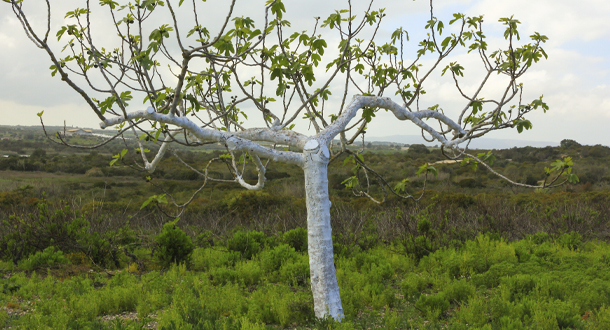
Third Sunday of Lent
Scripture:
Exodus 3:1-8a, 13-15
1 Corinthians 10:1-6, 10-12
Luke 13:1-9
Reflection:
In Sunday’s Gospel reading (Luke 13:1-9), Jesus tells a parable about a barren fig tree. The owner of the fig tree is frustrated. The tree has been there for three years without bearing any fruit. He tells his gardener to cut it down: “Why should it exhaust the soil?” But the gardener says, “Sir, leave it for this year also, and I shall cultivate the ground around it and fertilize it; it may bear fruit in the future. If not you can cut it down.”
The parable is a parable of God’s mercy. Even though we may not bear fruit as much as we could, God is still willing to work with us and in us so that we may bear fruit in spreading the Good News and in sharing God’s love in Jesus Christ. Can God be that merciful? It is God’s choice to be so. When we hear the story of the call of Moses in our first reading from Exodus (3:1-8a, 13-15), Moses asks God what to call Him when the people ask, “What is his name?” God replies, “I am who am. This is what you shall tell the Israelites: I AM sent me to you.” The same God who is the Source of all being is the same One who freed the Israelites from slavery in Egypt, and is the same One who continues to show us mercy and love.
But this parable also presents us with a few challenges. It implies that even though God is merciful, we should not abuse our relationship with Him. We ought not to take God’s mercy for granted. As St. Paul says in our second reading from 1 Corinthians (10:1-6, 10-12), “Therefore, whoever thinks he is standing secure should take care not to fall.”
The parable also challenges us about our relationships with others. Unfortunately, human history is replete with examples of one group saying about another something similar to “Why should it exhaust the soil?” It has been too easy for people to consider others as non-productive or superfluous, or even as a blight on the earth. In our Gospel reading, people tell Jesus how Pilate desecrated the blood of Galileans he presumably had killed. Then Jesus mentions some others who were killed when a tower fell on them. Jesus is quick to point out that these things were not a punishment for sins. God does not punish us like that! So why does Jesus warn the crowds that unless they repent they shall perish as those victims did? I believe it is because while God does not punish us with the evil of others, or with the tragedy of an accident, He does let us at times suffer the consequences of our actions.
Using the parable of the fig tree, if we resort to violence, whether it is physical violence to the point of genocide, or systematic discrimination or oppression, it is very likely we will suffer some violence ourselves. In various situations in the world we see a thirst for vengeance that never seems to be satisfied, and so one atrocity is answered by another. When we engage in condemnation and violence, how can we hope to bear any fruit? I know that we can say that we have not participated in any genocide or outright oppression, but we need to examine how often we resort to our stereotypes and prejudices to make sense of certain situations. Just being content with what is can help perpetuate what we know is wrong. When we treat others in a way that dehumanizes them, we need to remember the mercy God has shown us. I would think most of us can recognize times in our lives when we have been just like the fig tree in Jesus’ parable! Thank God that God has been merciful with us!
May we trust in God’s mercy, and show mercy to others. May we open ourselves to God’s love in Jesus Christ, and may that love bear fruit in us.
Fr. Phil Paxton, C.P., is the local superior of the Passionist Community in Birmingham, Alabama.
